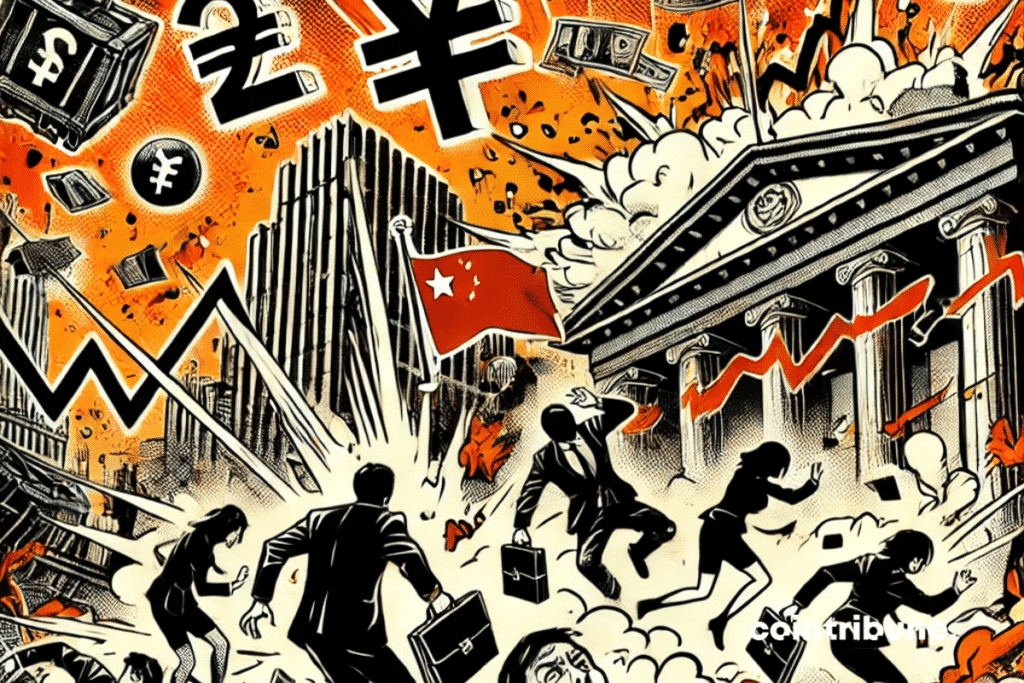China: Heading Towards Bankruptcy in 2025?
Following the collapse of the Chinese real estate sector, which represented 30% of the country’s GDP, China is heading towards a recession. Is China about to experience its “2008 crisis”?

What would Mao think of China?
Imagine for a moment the terrible Mao Zedong, founding father of modern China, waking up from his long sleep to observe today’s Chinese economy.
No doubt he would struggle to recognize his country. Skyscrapers as far as the eye can see, silent electric cars traversing the streets, and delivery robots distributing instant noodles to the corners of megacities. The “Great Leap Forward” has clearly taken an unexpected turn.
However, despite these outward signs of modernity, the Chinese economy is going through a turbulent phase. And not a minor one!
How is China really doing?
Official figures, usually as smooth as tofu, struggle to hide the reality of the slowdown. GDP growth in the second quarter of 2024 reached only 3.2%, a figure that would make many Western economies green with envy, but is far from the ambitious targets of the Chinese government.
Retail sales are stagnating, as if the Chinese had suddenly decided to go on a consumption strike.
But the figure that really gives Chinese leaders cold sweats is the youth unemployment rate, which has risen to 21%.
One in five young people is unemployed!
The Chinese stock market, meanwhile, seems to have caught a severe cold. The CSI 300 index has lost nearly 7% since the start of the year, heading for a fourth consecutive year of decline. Even as global markets are recovering.
What is the origin of these woes?
The bursting of the real estate bubble, which began in 2021, plays the role of the villain in this story. The sector, which accounted for nearly 30% of Chinese GDP (yes, you read that right, 30%!), collapsed following government-imposed restrictions.
The goal was commendable: to limit the debt of developers who were building entire cities for ghost inhabitants. The result: hundreds of halted construction sites and cranes taking naps, while many sector companies play “who will go bankrupt first?”.
What was Xi Jinping’s response to this monumental crisis? Redirect resources from the real estate sector to high-end manufacturing.
Goodbye to empty apartments, welcome to the “new productive forces”! Electric vehicles, batteries, bioproduction, drones… Xi dreams of a high-tech China, creating high-productivity jobs and self-sufficient in the face of American pressures.
Towards a recession in China
All the signs of a recession are present in China. Inflation has been in negative territory for several months. Nominal interest rates are also falling, a sign that no one really believes in a quick recovery.
The real estate crisis has weakened overall Chinese demand, and for several reasons. Firstly, it has weakened the country’s banking system. Many local banks have lent astronomical amounts to “local government financing vehicles,” barbaric-named entities created to finance infrastructure.
These loans, guaranteed by the value of the land, have become extremely risky. The result: weakened banks are reducing the granting of new credits.
Secondly, the negative wealth effect pushes households to save. Real estate was the main asset of the Chinese. Its depreciation makes them more cautious in their spending. Moreover, many savers have invested in wealth management products backed by real estate, whose value is collapsing.
Finally, deflation worsens the debt problem. With falling incomes and prices, the real burden of repayments increases. It’s like your salary decreasing but your rent remaining the same. This pushes households and businesses to further reduce their spending, fueling a deflationary vicious circle.
Towards stimulus policies to avoid the crash?
In the face of this worrying situation, most economists are calling for a massive stimulus plan focused on consumption. In short, they want the Chinese government to play Santa Claus and distribute yuans hand over fist to encourage people to consume.
But the central government hesitates to take the plunge.
Another option would be to address the root causes of weak demand. This would involve recapitalizing banks to clean up their balance sheets and revive credit. Again, Chinese leaders seem reluctant, perhaps for fear of setting a precedent or publicly admitting the extent of the problem.
However, it is the combination of stimulus measures and bank bailouts that allowed the United States to avoid a decade-long recession after the 2008 crisis.
Contrary to pessimistic forecasts predicting a new Great Depression, the US economy regained solid growth as early as 2012.
Xi Jinping and his supporters are convinced they can micromanage the economy to overcome all obstacles. It’s a bit like a conductor thinking they can control every note played by every musician. But History teaches us that macroeconomics does not behave that way. By refusing to deploy a stimulus plan, China risks learning this the hard way.
A worrying demographic aging in China
The challenge is even greater as the population is aging rapidly. Middle-aged Chinese are massively saving for retirement, aware that they cannot rely on the support of their only child.
The one-child policy, while it has controlled demographic growth, is now backfiring on the Chinese economy. Moreover, the savings of future retirees, mainly invested in real estate, are melting like snow in the sun. These poor Chinese, who imagined having a nest egg for their retirement, are watching it shrink…
In this context, a considerable consumption stimulus plan would be needed. Imagine having to convince millions of worried Chinese about their retirement to spend their money instead of saving it. A challenge that the Chinese government does not seem ready to tackle at the moment.
Unless there is a radical change in economic policy, China could therefore experience a long period of sluggish growth.
The consequences would be significant, both for the world economy and the political stability of the regime. Learning that the world’s second-largest economy is derailing is rarely good news…
Time is running out for Xi Jinping if he wants to prevent his “Chinese dream” from turning into an economic nightmare. The whole world is watching the economic turbulence China is going through. If the country does not recover and continues to sink into recession, the entire world economy risks collapsing with it.
Maximize your Cointribune experience with our "Read to Earn" program! For every article you read, earn points and access exclusive rewards. Sign up now and start earning benefits.

Chaque jour, j’essaie d’enrichir mes connaissances sur cette révolution qui permettra à l’humanité d’avancer dans sa conquête de liberté.
The views, thoughts, and opinions expressed in this article belong solely to the author, and should not be taken as investment advice. Do your own research before taking any investment decisions.